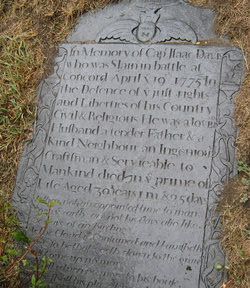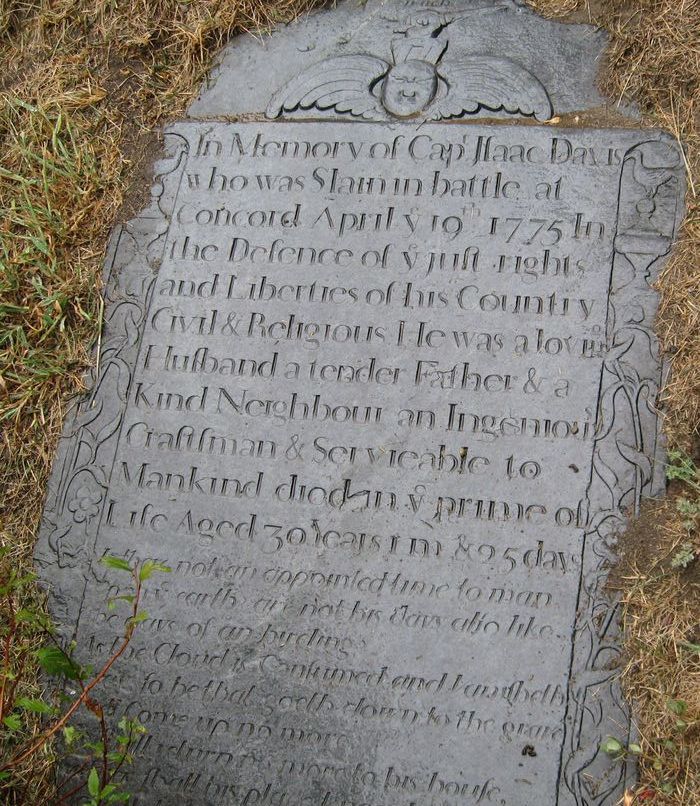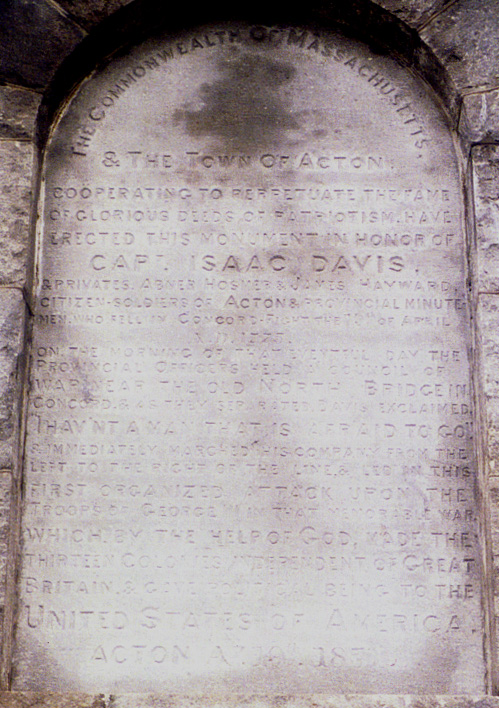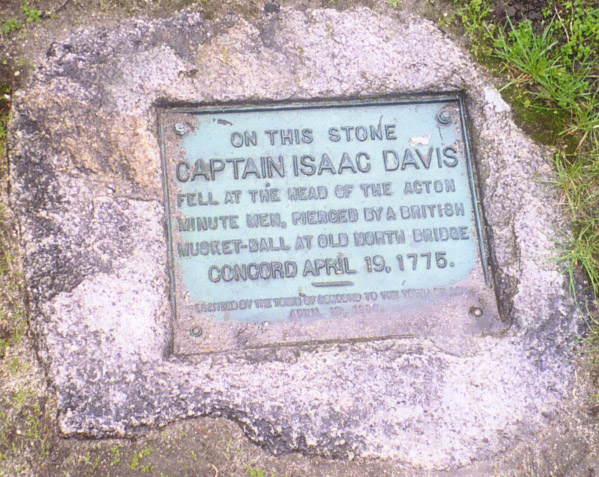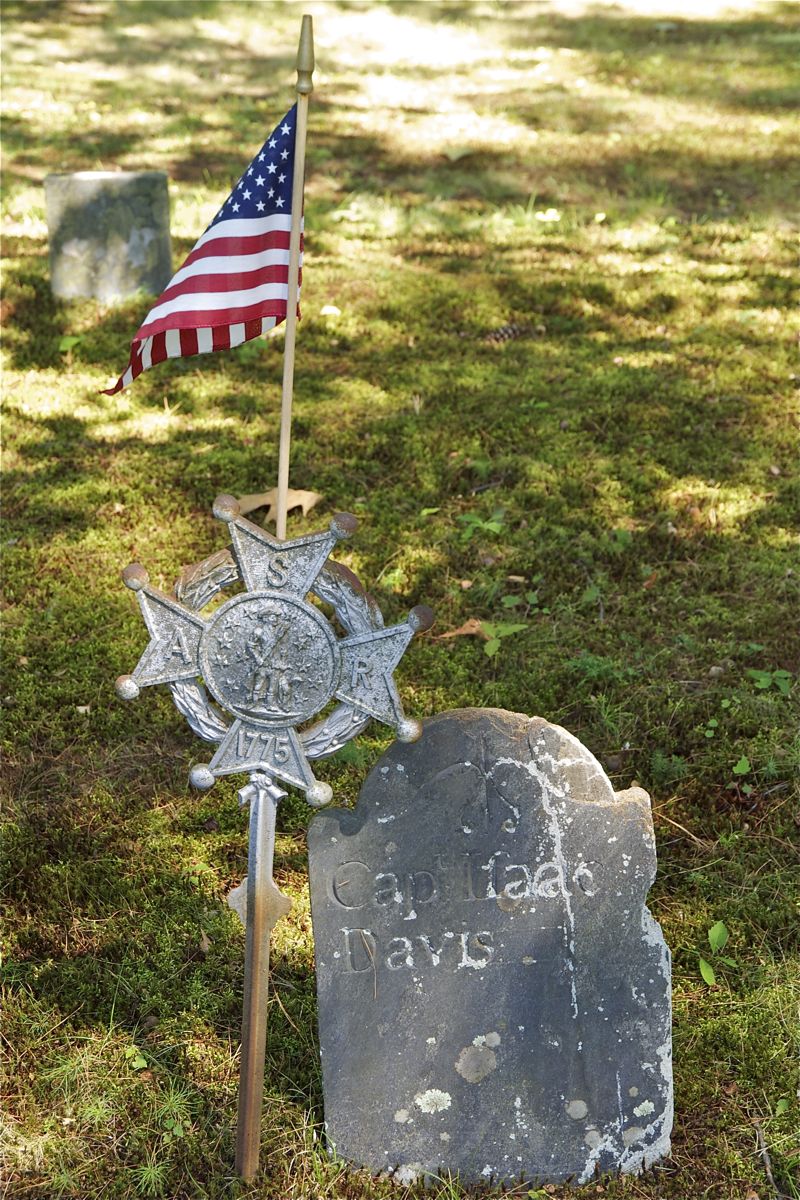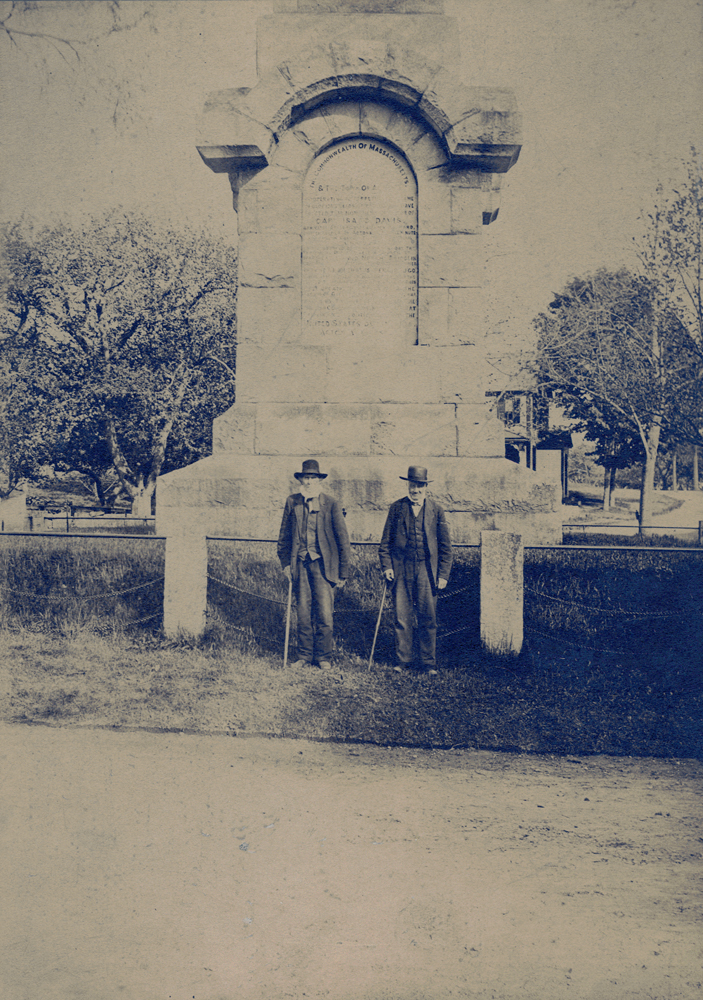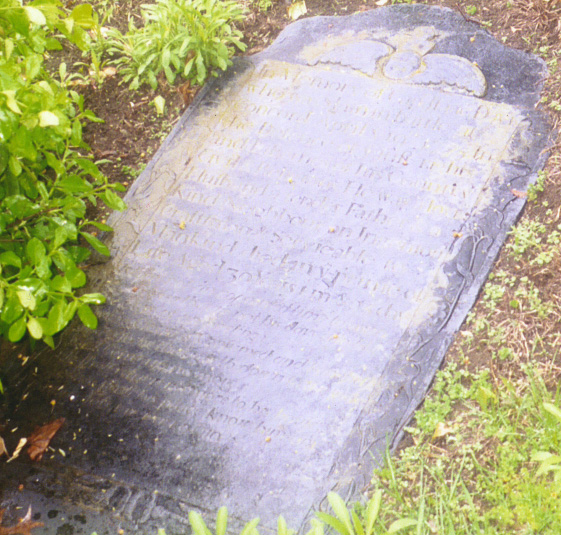He was the son of Ezekiel and Mary (Gibson) Davis. He married Hannah Brown, of Acton, Oct. 24, 1764. He became a member of the church in 1765. He was by trade a gunsmith and had the reputation of being a good workman. In November, 1774, a company of minute-men was raised in Acton, by enlistment, which elected Isaac Davis as Captain. They met twice a week during the winter to drill and when called to service had reached such a state of efficiency that they were considered the best armed and most reliable of the companies of minute-men in the vicinity.
Capt. Davis was a born soldier and in response to the cry of alarm sounded by Paul Revere, Capt. Davis' Co. quickly gathered at his house and were ready to march. After forming his Co. in the road, he returned to his house. His stout heart must have been sorely tried, for he left a young wife and four sick children. He could only say "Hannah, take good care of the children" and then led the way to the Old North Bridge. In the hastily called council of war, which was held before the fight Capt. Davis took part and when it broke up he gave the encouraging assurance "That he hadn't a man that was afraid to go." Suiting the action to the word he took his command from the left to the right of the line and to the tune of "The White Cockade," led the first organized attack upon the British Invaders.
After receiving the fire of the enemy he was in the act of sighting his gun when they again fired and Capt Davis fell shot through the heart.
He was the first commissioned officer killed in the Revolutionary war. He was but thirty years and two months of age when he fell.
(The above is from A Brief Tribute to the Memory of Capt. Isaac Davis written by Hon. Luther Conant of Acton, Mass)
Children (b. in Acton, MA)
Isaac, May 14, 1765 - ?
Hannah, Nov. 1766 - Dec. 10, 1766
Hannah Davis Noyes,
Feb. 11, 1768 - Mar. 5, 1813
Ephraim, Mar. 7, 1770 - Nov. 19, 1845
Paul, Dec. 3, 1772 - Dec. 10, 1772
Mary Davis Fitch,
Jan. 3, 1774 - 1847, Springfield N.Y
Capt. Isaac Davis, and Privates Abner Hosmer and James Hayward, were all reinterred at the Davis Monument that was dedicated October 20th, 1851.
~
Cenotaph here
He was the son of Ezekiel and Mary (Gibson) Davis. He married Hannah Brown, of Acton, Oct. 24, 1764. He became a member of the church in 1765. He was by trade a gunsmith and had the reputation of being a good workman. In November, 1774, a company of minute-men was raised in Acton, by enlistment, which elected Isaac Davis as Captain. They met twice a week during the winter to drill and when called to service had reached such a state of efficiency that they were considered the best armed and most reliable of the companies of minute-men in the vicinity.
Capt. Davis was a born soldier and in response to the cry of alarm sounded by Paul Revere, Capt. Davis' Co. quickly gathered at his house and were ready to march. After forming his Co. in the road, he returned to his house. His stout heart must have been sorely tried, for he left a young wife and four sick children. He could only say "Hannah, take good care of the children" and then led the way to the Old North Bridge. In the hastily called council of war, which was held before the fight Capt. Davis took part and when it broke up he gave the encouraging assurance "That he hadn't a man that was afraid to go." Suiting the action to the word he took his command from the left to the right of the line and to the tune of "The White Cockade," led the first organized attack upon the British Invaders.
After receiving the fire of the enemy he was in the act of sighting his gun when they again fired and Capt Davis fell shot through the heart.
He was the first commissioned officer killed in the Revolutionary war. He was but thirty years and two months of age when he fell.
(The above is from A Brief Tribute to the Memory of Capt. Isaac Davis written by Hon. Luther Conant of Acton, Mass)
Children (b. in Acton, MA)
Isaac, May 14, 1765 - ?
Hannah, Nov. 1766 - Dec. 10, 1766
Hannah Davis Noyes,
Feb. 11, 1768 - Mar. 5, 1813
Ephraim, Mar. 7, 1770 - Nov. 19, 1845
Paul, Dec. 3, 1772 - Dec. 10, 1772
Mary Davis Fitch,
Jan. 3, 1774 - 1847, Springfield N.Y
Capt. Isaac Davis, and Privates Abner Hosmer and James Hayward, were all reinterred at the Davis Monument that was dedicated October 20th, 1851.
~
Cenotaph here
Inscription
I Say Unto All Watch.
In Memory of Capt. Isaac Davis/
who was slain in battle at
Concord April ye 19th 1775 in/
the defence of ye just rights/
and liberties of his country/
civil & religious. He was a loving/
husband a tender father & a/
kind neighbour an ingeneous/
craftsman & serviceable to/
mankind. Died in ye prime of/
life aged 30 years 1 m., & 25 days.
Is there not an appointed time to man upon ye earth? Are not his days also like the days of an hireling? As the cloud is consumed and vanisheth away, so he that goeth down to the grave shall come up no more. He shall return no more to his house, neither shall his place know him any more. -- Job vii. 1, 9, 10.
[A rough transcription based on the hard to read stone as well as Abram English Brown's "Beneath Old Roof Trees," Lee and Shepard Publishers, Boston, 1896.]
